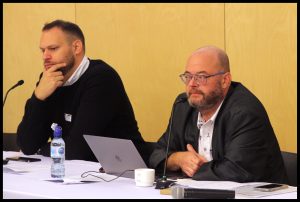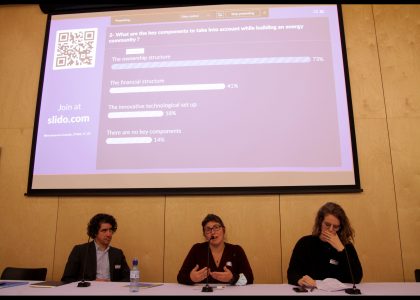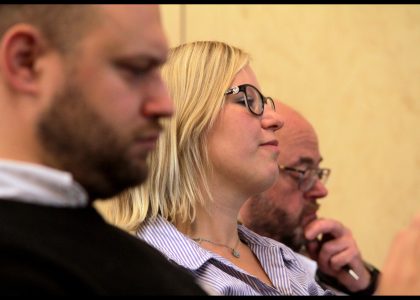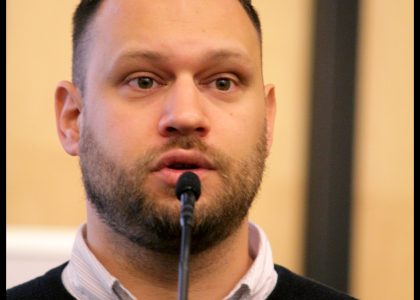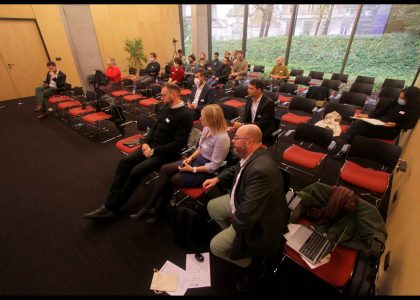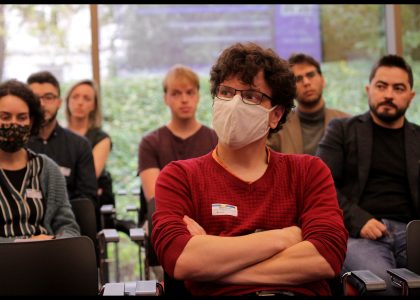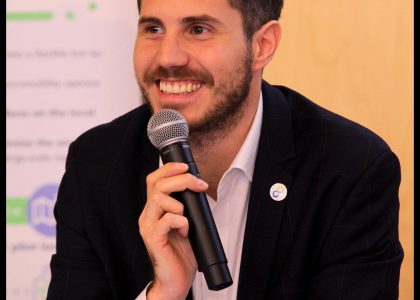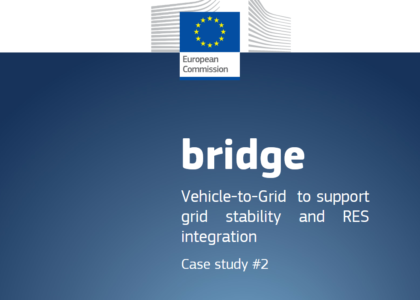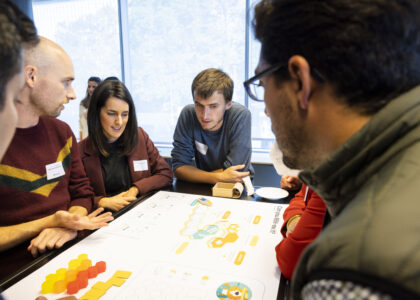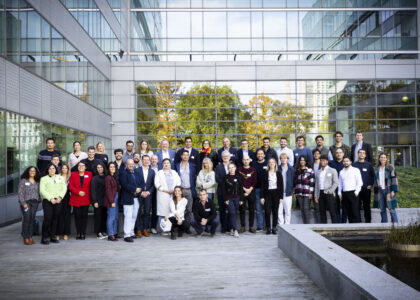by Nikolas Giampaolo, project consultant at Deep Blue Italy
STEER IT UP – Hands on event was a success! On the 21st of October the RENAISSANCE project and COMPILE project hosted the first Pan-European event in Brussels, to allow interested participants understand both research approaches and explore the tools developed in support of emerging energy communities. The overall event was a success! In total 28 people joined in person and 25 followed us online, with lively discussions in a most informal atmosphere.
Below a few highlights of the event.
WELCOME KEYNOTE
from prof. Thierry Coosemans | VUB and Tomi Medved | University of Ljubjana
The event started with project presentations from prof. Thierry Coosemans, coordinator of the Renaissance project, and Tomi Medved, deputy coordinator of the Compile project. The two interchanged on stage with a vivid presentation on the topic of energy communities and the increasing need to adopt new business models for a sustainable future.
KEYNOTES SESSION
Frederik Loeckx | Flux 50
Christine Lins | GWNET
Achille Hannoset | DG Energy
After the introduction three keynote speeches were delivered by Frederik Loeckx from Flux 50, Christine Lins from the Global Women Network for the Energy Transition (GWNET) and Achille Hannoset from the DG Energy. Frederik Loeckx expanded on the necessity to put more effort in energy communities as a way to breakthrough traditional centralized forms of energy distribution. According to him, energy communities could represent a positive disruption in the overall socio-technical system which could then become the norm. Christine Lins demonstrated the high involvement of women in energy production and sharing choices both in households and in local communities and advocated for more research and capacity building in this direction. Achille Hannoset summarized the perspective and expectations towards energy communities in Europe, confirming their vertical growth in Europe, despite the Covid-19 pandemic. He concluded that barriers still exist, especially at the Member States regulations level, and remarked that transposition should accelerate in order to facilate the transition.
(links to keynote presentations available soon…)
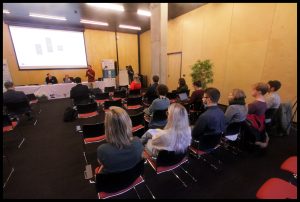
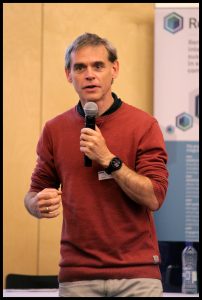
Crossed introduction of the pilot sites
After the keynotes representatives from each pilot introduced the site characteristics, the deployment process and the level of maturity and efficacy reached in the past few months. The presentations covered:
- Luče (Compile)
- Crevillent (Compile)
- Križevci (Compile)
- Lisbon (Compile)
- Rafina (Compile)
- Jette (Renaissance)
- Eemnes (Renaissance)
- Manzaneda (Renaissance)
- Kimmeria (Renaissance)
Panel discussion
Josh Roberts (Rescoop.eu), Alix Bolle (Energy Cities), and Els van Praet (Ecopower) were the three invitees of the panel, facilitated by Stanislas d’Herbemont (Rescoop.eu). The discussion focused on the actual barriers to the implementation of energy communities, especially at policy and regulatory level. Research projects should offer citizens and all potential members of a new energy community the informative tools to better orient themselves into incentive schemes and bureaucratic aspects. Also, create opportunities for actual empowerment and involvement in the decision making processes since early phases.
Around 20 people from the audience answered to three questions via the Sli.Do platform.
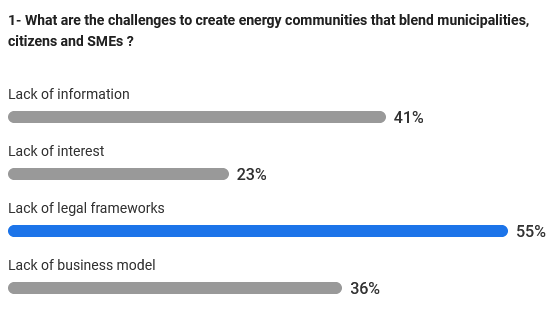
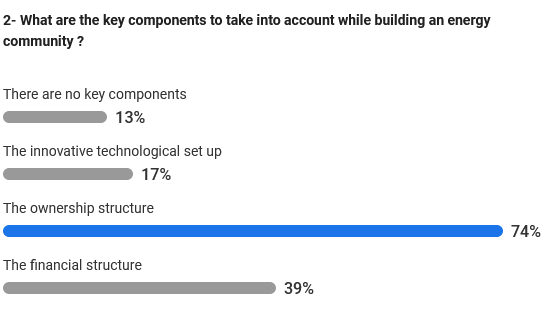
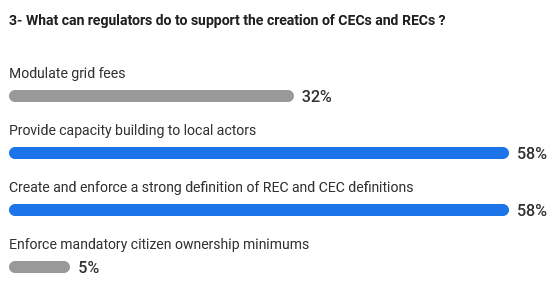
Free Roaming Session – Showcase of tools
Following the Panel Discussion a showcase of the different existing tools started. The showcase was provided in a hybrid mode and presenters answered questions coming from both the physical and online audience. The demos available on our YouTube playlist include:
- MAMCA consensus building software – The Multi Actor Multi Criteria Analysis (MAMCA) is used to evaluate demonstrator’s business ecosystems, promoting consumer/prosumer and all stakeholders participation, to build consensus around site-specific new business cases and allow involved parties focusing on a common goal.
- RENERGISE tool – The Multi-vector Optimization tool will be able to provide all interested stakeholders of future energy communities with various optimised design configurations, customised components and operational guidelines to facilitate the growth of flexible networks. Such a tool will foster the transition of energy production towards a more resilient and balanced prosumer oriented system.
- RENAISSANCE platform – The RENAISSANCE Information Platform will allow for daily operational management of local energy communities encompassing technical operation, peer-to-peer trading and interaction with the involved stakeholders. The blockchain infrastructure alongside a smart contract editor will facilitate the dynamic creation of smart contracts, leveraging the RENAISSANCE platform and the system’s overall architecture in achieving the most fitting business model outline. The Social Engine included in the platform, an associated digital tool of RENAISSANCE, will formulate a permanent mechanism for the user involvement, whether they are energy consumers or prosumers, through a highly engaging environment of shared activities and extensive user interaction capabilities.
- HomeRule (COMPILE)
- ComPilot (COMPILE)
- Roundtable on social engagement
PLENARY SESSION
The event ended with a plenary session to answer the remaining questions from the audience and a group picture!
Watch the full event recording
Follow us:
